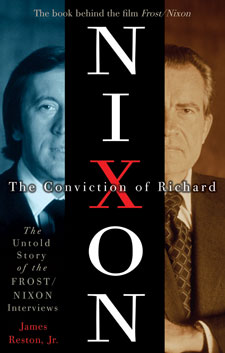If you are looking for a book that will give you an in-depth understanding of the events that led to the resignation of Richard Nixon from the Presidency of the USA, then The Conviction of Richard Nixon is not the book for you.
Rather, as the subtitle states, the focus of this book is the series of interviews that David Frost conducted with Richard Nixon in 1977. These interviews were watched by over 45 million people and hold a significant place in the history of television. What made them so significant was the way in which Nixon was brought to apologise for the first time for the wrongs that he had done.
The author of The Conviction of Richard Nixon, John Reston Jr, was one of the researchers that assisted David Frost with these interviews. A good way of summarising this book is to say that it is a story of the triumph of research by the researcher who triumphed. This is because Nixon's apology came after Frost had pulled the rug from under Nixon's defences by surprising him with a number of revelations that Reston had discovered in his research.
 The surprises that Reston discovered were contained in the transcripts of conversations between Nixon and Chuck Colson which, up to that time, had not been on the public record (it seems that an administrative error was the reason why Reston was able to gain access to them). Reston's words about Colson give Christians great cause for reflection about what our lifestyles say to the world around us. He says:
The surprises that Reston discovered were contained in the transcripts of conversations between Nixon and Chuck Colson which, up to that time, had not been on the public record (it seems that an administrative error was the reason why Reston was able to gain access to them). Reston's words about Colson give Christians great cause for reflection about what our lifestyles say to the world around us. He says:
By 1976, Colson's own character deficiencies were well known to most, even though he was skilfully and lucratively trying to mask them with his witness to Jesus. By the fall of 1976 he had made more money off Watergate than any other Nixon underling, including John Dean.
When Stanford and I arrived at his "Reconciliation House" in the posh Cleveland Park section of Washington, we were ushered into a beautifully appointed room full of antiques, bronze statuettes, leatherbound books. The room had the air of an executive suite. If one had to give his life in sacrifice for Christ, then this was certainly the way to go. (p37)
There are other themes that emerge in this book that will be of interest to Christians. Reston agreed to do research for Frost because he wanted to see Nixon brought to some kind of justice, even if it was only trial by television. It seems that many believed at that time that justice for Nixon had been obstructed by Gerald Ford's pardon of Nixon. It must be said that the story of Nixon in this sense is the same as our story, for we are the guilty who have received an underserved pardon from God.
Reston was also fearful that Nixon would try to use the Frost interviews as a way of rehabilitating his reputation in the hope that this would re-open the curtains to public life. However, the Frost interviews succeeded in making sure that this wouldn't happen and this was a good thing. Any leader who says; "If the President does it, that means it's not illegal," has shown that they do not have the right character to lead.
1 Timothy 3 makes it very clear that good character is vital in Christian leadership. Sadly, we Christians are sometimes confronted with leaders who have failed to show godly character in the past. Like Reston, we should be fearful of and resistant to the re-emergence in Christian leadership of such people.
The Conviction of Richard Nixon will be easily understood by those who are familiar with the events of which it speaks. For those who aren't it will probably require a second read. It made much more sense to me the second time around.























